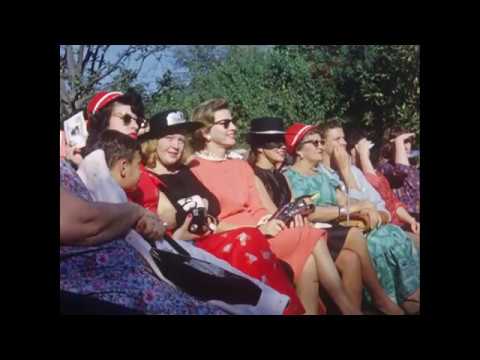Guy Williams as Zorro at Disneyland, 1958
Preserved by the Academy Film Archive in 2015, this 16mm home movie features the cast of Disney’s “Zorro” television series (1957-1959) as they reenact their roles for a live audience at the Disneyland theme park. As Disney’s “Zorro” was a black-and-white program, this film contains rare behind-the-scenes footage of the show’s characters in color. The film was shot by George Wilbern, who worked as a film editor and was part of the motion picture unit during World War II.
In addition to featuring the stars of the popular “Zorro” series, this footage provides a glimpse of operations at Disneyland when the park was still young. Walt Disney began developing ideas for a theme park as early as the 1930s but struggled for decades to get the appropriate budget to move forward. In 1954, he secured funding from the ABC network, under the condition that his Walt Disney Studio would produce a weekly anthology series, entitled “Walt Disney’s Disneyland.” The park opened to the public in 1955, though by 1957, Disney felt it was an unsuccessful venture and sought additional funding from ABC. In exchange, ABC requested even more programming, and after sitting on the “Zorro” rights for several years, Disney put the new series into production and premiered it in October of 1957. To advertise “Zorro,” the cast made many public appearances at Disneyland. The performance in the home movie features key cast members, including Zorro (Guy Williams), Sergeant Garcia (Henry Calvin), Bernardo (Gene Sheldon) and Anna María Verdugo (Jolene Brand), as well as Disneyland staples, such as the Mark Twain Riverboat and the Golden Horseshoe Revue. It documents one of the cast’s last appearances at the park, which took place over Thanksgiving weekend in 1958. These live events were representative of Disney’s elaborate cross-promotional strategy at the time, which sought to drive television audiences to visit Disneyland and park attendees to watch the “Zorro” show.
The Archive regards home movies as an important part of motion picture heritage, as these works capture daily life and special events from diverse points of view, and in some cases, they document behind-the-scenes activities for feature films and television programs.
Learn more about the Home Movie Collection:
http://www.oscars.org/film-archive/collections/home-movie-collection




